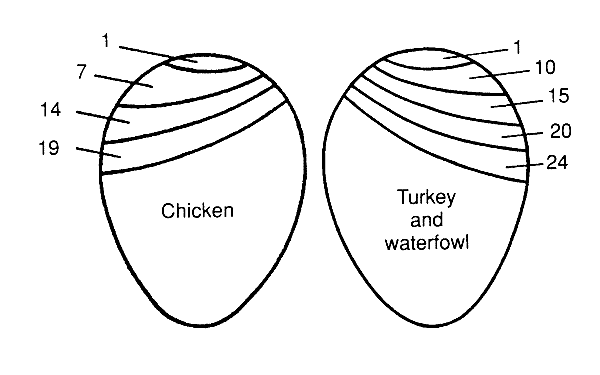PaulX
Songster
- Nov 15, 2018
- 309
- 818
- 171
Hello,
It's an emergency!
I'm on day 20 of duck incubation (so 19 days have passed), and all my eggs have air cell size between the size of 10 and 15 days shown below here, the majority of them even much closer to 10 days' size than 15.

I added a little water until the relative humidity was between 55-60% for the first 13 days. Seeing the air cells already worryingly small back then, I stopped adding water and have been running dry, but even dry the humidity was about 39-40% Now I just candled again because I'm worried about the air cells, and they were still so worrying small as said above.
To make matters worse, when I closed the incubator lid and started it up again, the humidity shot up to 72%! The outdoors humidity is 74% right now according to weather forecast, seems the humidity was only lower before I opened the incubator because yesterday's air was dryer. I'll have to try reopening the incubator again tomorrow to bring the humidity down (tomorrow's humidity is forecasted to be 59%, at least much better than today.
Is there anything else I could do to salvage this batch of eggs? I don't have a dehumidifier or anything like that, not even a clue how to get one... never seen one before in my life.
I'm thinking I might try to reduce the temperature to below optimal temperature, to delay the development and hatch so I have more time to lose the moisture. I'm also thinking of making small hole in the shell and maybe break the air cell myself at day 26 so I can ensure the embryo have air to breathe. In fact I am even thinking of cracking the shell a little at the top now, as one egg that came slightly cracked from shipping currently have the biggest air cell and ironically the most likely to survive.
Do you reckon these are good ideas?
Do you have experience with very small air cells? How was your chance?
Da..n most of the humidity recommendations on the internet were dead wrong. I even saw an academic article that says 65% humidity give best result for duck eggs, couldn't be more wrong.
It's an emergency!
I'm on day 20 of duck incubation (so 19 days have passed), and all my eggs have air cell size between the size of 10 and 15 days shown below here, the majority of them even much closer to 10 days' size than 15.

I added a little water until the relative humidity was between 55-60% for the first 13 days. Seeing the air cells already worryingly small back then, I stopped adding water and have been running dry, but even dry the humidity was about 39-40% Now I just candled again because I'm worried about the air cells, and they were still so worrying small as said above.
To make matters worse, when I closed the incubator lid and started it up again, the humidity shot up to 72%! The outdoors humidity is 74% right now according to weather forecast, seems the humidity was only lower before I opened the incubator because yesterday's air was dryer. I'll have to try reopening the incubator again tomorrow to bring the humidity down (tomorrow's humidity is forecasted to be 59%, at least much better than today.
Is there anything else I could do to salvage this batch of eggs? I don't have a dehumidifier or anything like that, not even a clue how to get one... never seen one before in my life.
I'm thinking I might try to reduce the temperature to below optimal temperature, to delay the development and hatch so I have more time to lose the moisture. I'm also thinking of making small hole in the shell and maybe break the air cell myself at day 26 so I can ensure the embryo have air to breathe. In fact I am even thinking of cracking the shell a little at the top now, as one egg that came slightly cracked from shipping currently have the biggest air cell and ironically the most likely to survive.
Do you reckon these are good ideas?
Do you have experience with very small air cells? How was your chance?
Da..n most of the humidity recommendations on the internet were dead wrong. I even saw an academic article that says 65% humidity give best result for duck eggs, couldn't be more wrong.







